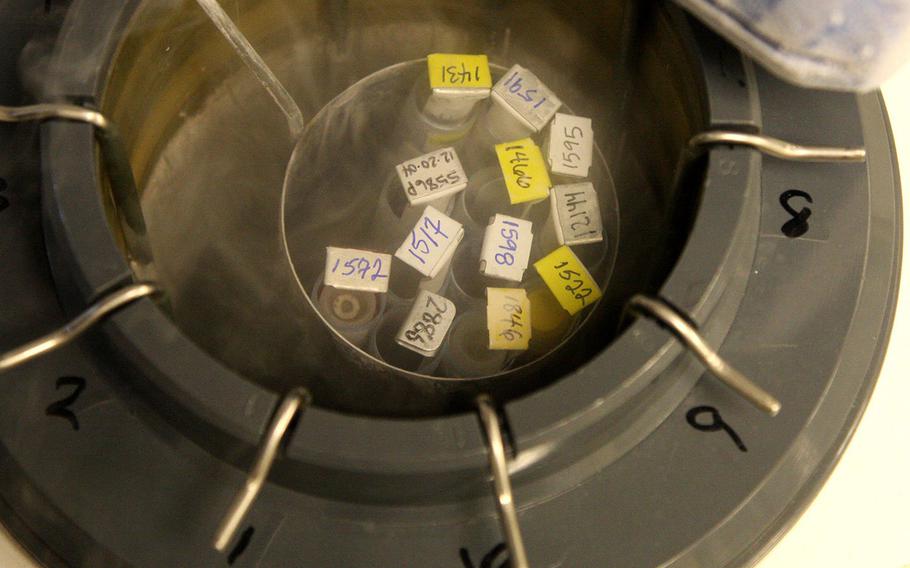
Goblet, a long tube device that contains a vitrification freezing platform for embryos and sperm in a liquid nitrogen tank, in the in vitro fertilization lab at the Reproductive Science Center in San Ramon, California, on August 22, 2013. (Jim Stevens, Bay Area News Group/Tribune News Service)
WASHINGTON — Wounded veterans hoping to start families appeared to win a significant victory Thursday with a new law allowing coverage of fertility treatment through the Department of Veterans Affairs.
The legislation passed Congress on Wednesday night despite long opposition from conservatives, and it allows the VA to cover in vitro fertilization costs for the first time in 24 years. But it falls short of the ultimate goal of advocates – permanently lifting a 24-year-old ban on VA coverage of IVF -- and comes with some caveats.
It provides no specific dollar amount to pay for the procedures and expires after two years, according to a key sponsor, Sen. Patty Murray, D-Wash. Also, the VA will have discretion over whether it pulls money for IVF costs from its larger budget, leaving open the question of whether it will indeed provide the coverage.
“It’s a first step but what ultimately needs to happen is the ban needs to be repealed,” said Kerry Arndt, a spokeswoman for Murray, who has spent years pushing for veteran IVF coverage.
Last year, the VA testified to Congress that it supports the idea of IVF for veteran families who are struggling to have children – as long as it receives “additional resources” to cover the costs.
On Friday, the department reaffirmed its support but did not say whether it will provide coverage without additional money from Congress, despites questions from Stars and Stripes.
“Including IVF in the medical benefits package would be consistent with the Department of Veterans Affairs’ goal to restore the capabilities of veterans and to improve the quality of veterans’ lives,” according to a statement released by spokeswoman Walinda West.
Thousands of troops suffered traumatic wounds to their genitals and spines due to the widespread use of improvised explosive devices against U.S. forces in Iraq and Afghanistan, making it difficult or impossible for them to procreate. IVF involves collecting eggs from a woman’s ovaries and fertilizing them with sperm in a laboratory.
Treatment involving wounded men can average more than $10,000 per pregnancy attempt, but the VA health care system has been barred from covering the costly procedures since 1992.
The legislation sponsored by Murray was passed by Congress as part of a last-minute temporary budget bill to fund the VA and keep the federal government open beyond Friday. President Barack Obama signed the bill into law Thursday afternoon.
It allows the VA to use money over the next two years on IVF and other reproductive treatments, but after that the authority will expire unless Congress acts to pass another authorization or moves to repeal the 24-year-old ban.
Murray had been pushing for a full repeal of the IVF ban and sponsored multiple pieces of legislation over the past three years, but she was unable to gain enough support.
Arndt said opposition forced Murray to come up with the “workaround” legislation.
It was applauded by Veterans of Foreign Wars, Iraq and Afghanistan Veterans of America and Paralyzed Veterans of America.
“This benefit is long overdue, but this is only the first step,” Allison Jaslow, chief of staff at IAVA, said in a released statement.
About 1,400 troops suffered severe genital injuries during the past 15 years of war, and thousands more have spinal injuries that could preclude having children, according to Paralyzed Veterans of America.
Religious conservatives in Congress have opposed government coverage of the procedure due to concerns over discarded embryos, which could have developed into babies.
In April, Rep. Jeff Miller, R-Fla., the chairman of the Committee on Veterans’ Affairs, offered a workaround for Republicans uneasy about the government directly covering IVF.
He proposed $20,000 lump-sum payments to veterans who have lost the use of their reproductive organs through traumatic injury or paralysis.
The money could assist with adoption or foster care costs, Miller said at the time. It could also be used for fertility treatments by the recipients.